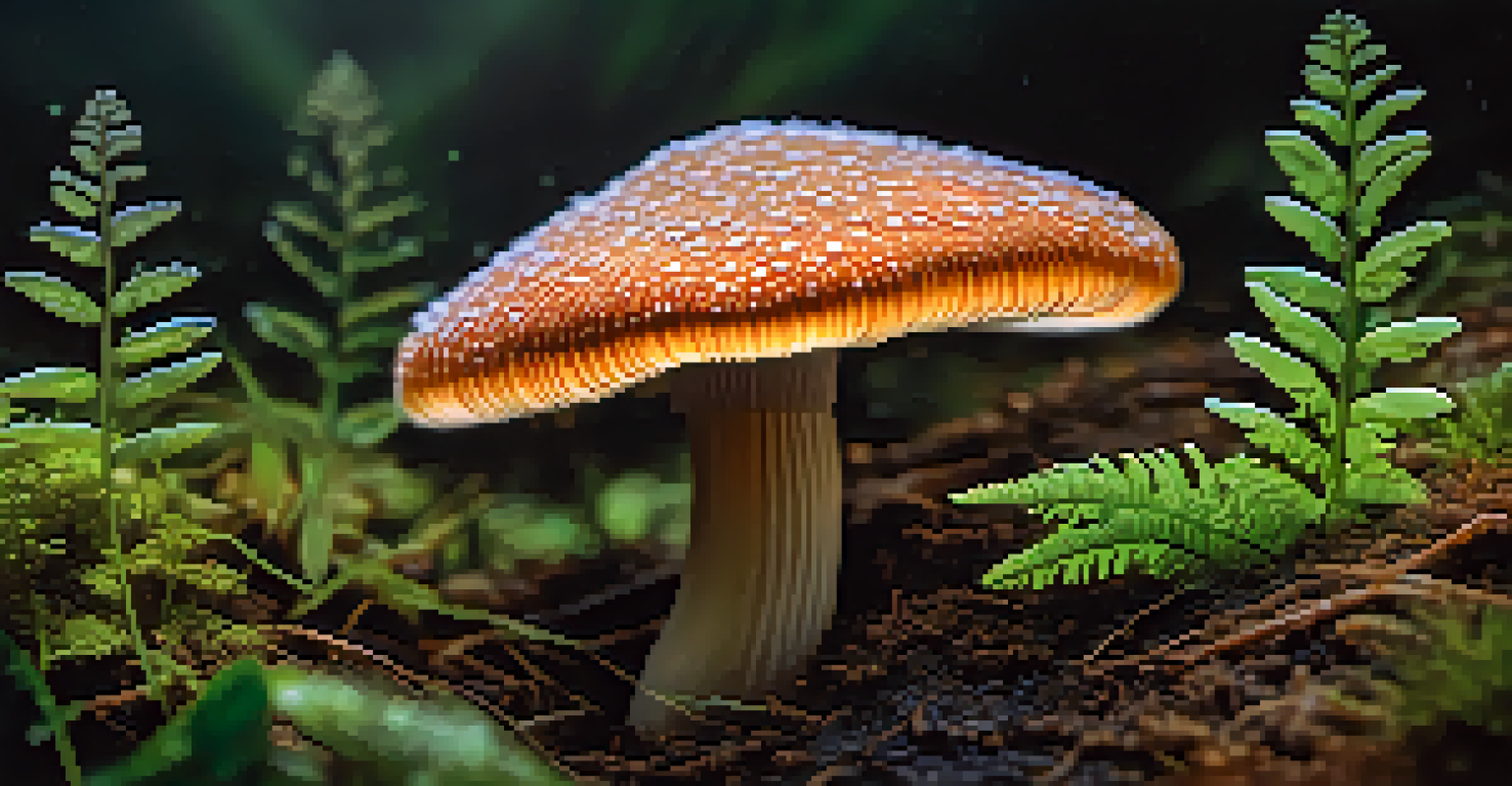Memory and Entheogens: Insights from Psychological Research

Understanding Memory: The Basics of Cognitive Function
Memory is a fundamental cognitive function that allows us to store, retrieve, and use information from our past experiences. It encompasses various types, including short-term memory, which holds information temporarily, and long-term memory, which can last a lifetime. The brain structures involved, such as the hippocampus, play crucial roles in how memories are formed and recalled.
Memory is the treasure house of the mind wherein the monuments thereof are kept and preserved.
Psychologists often categorize memory into different types: explicit (conscious recall) and implicit (unconscious influences). This classification helps in understanding how we learn and retain information. By grasping these basics, we can better appreciate the potential effects of substances like entheogens on memory processes.
As we delve deeper, we realize that memory isn't just a passive storage system; it's dynamic and influenced by various factors, including emotions and environmental cues. This complexity sets the stage for exploring how entheogens might interact with these memory systems.
What Are Entheogens? A Brief Overview
Entheogens are substances that can alter perception, cognition, and mood, often used in spiritual or therapeutic contexts. Common examples include psilocybin from mushrooms, mescaline from cacti, and ayahuasca, a brew made from Amazonian plants. These substances have been used for centuries in various cultures to facilitate introspection and connection with deeper aspects of consciousness.

Research into entheogens has gained traction in recent years, particularly for their potential therapeutic applications, including enhancing emotional well-being and fostering personal insights. While they can induce profound experiences, understanding their effects on memory is a crucial area of study. Many users report heightened awareness and vivid recollections during entheogenic experiences.
Memory's Dynamic Nature
Memory is not just a passive storage system; it is influenced by emotions and environmental cues, which can be affected by substances like entheogens.
By examining these properties, we can begin to comprehend how entheogens could potentially enhance or alter memory processes. This leads us to consider the implications for psychological research and therapeutic practices.
The Intersection of Memory and Entheogens in Psychological Research
Psychological research increasingly investigates the relationship between entheogens and memory enhancement, seeking to uncover how these substances influence cognitive functions. Some studies suggest that entheogens may enhance memory recall and emotional processing, providing a unique lens through which to understand our past experiences. This intersection of memory and altered states of consciousness offers exciting possibilities for both science and personal growth.
The mind is everything. What you think you become.
For instance, participants in studies often report enhanced clarity of past memories and feelings of catharsis. This suggests that entheogens may help individuals confront and process traumatic experiences, potentially leading to improved mental health outcomes. Such findings challenge traditional approaches to memory therapy and open doors for innovative treatment methods.
However, it's essential to approach these findings with caution. While the benefits can be promising, further research is needed to fully understand the long-term effects and risks associated with entheogen use in memory enhancement.
Case Studies: Real-Life Applications of Entheogens in Therapy
Numerous case studies highlight the therapeutic potential of entheogens in treating various psychological conditions, including PTSD and depression. For example, some veterans have reported significant improvements in their mental health after participating in guided sessions involving psilocybin. These experiences often lead to profound insights, fostering a sense of healing and resolution.
Additionally, research involving ayahuasca has shown promising results in enhancing emotional processing and memory. Participants describe vivid recollections and a greater understanding of their life experiences. This suggests that entheogens may play a role in memory reconsolidation, a process where memories are altered or strengthened upon recall.
Therapeutic Potential of Entheogens
Entheogens have shown promise in therapeutic settings, potentially enhancing memory recall and emotional processing for conditions like PTSD and depression.
These case studies provide valuable insights into how entheogens can be integrated into therapeutic practices, paving the way for more holistic approaches to mental health care. As we learn from these experiences, the need for responsible use and professional guidance becomes increasingly clear.
The Mechanisms Behind Memory Enhancement with Entheogens
Understanding how entheogens influence memory involves delving into the brain's neurochemistry. Many entheogens primarily affect serotonin receptors, particularly the 5-HT2A receptor, which plays a role in mood regulation and perception. This interaction may lead to alterations in how memories are processed and recalled.
Research indicates that entheogens might promote neuroplasticity, the brain's ability to reorganize and form new connections. This could facilitate the integration of past experiences and emotional healing, contributing to enhanced memory recall. Essentially, entheogens may create an environment where memories are more accessible, leading to deeper understanding and reflection.
However, the precise mechanisms are still being explored, and ongoing research is crucial to unraveling the complexities of these interactions. As we uncover more about how entheogens impact memory, we can better understand their potential therapeutic applications.
Ethical Considerations in Entheogen Research and Use
As interest in entheogens grows, ethical considerations surrounding their use in research and therapy become paramount. Ensuring participant safety and informed consent is crucial, particularly when dealing with substances that can profoundly alter consciousness. Researchers must adhere to rigorous ethical guidelines to protect individuals' mental and physical well-being.
Moreover, the cultural context of entheogen use cannot be overlooked. Many indigenous traditions have long utilized these substances for spiritual growth and healing, and it's essential to respect and honor those practices. Appropriating these traditions without understanding their significance can lead to ethical dilemmas and potential harm.
Ethics in Entheogen Research
As research into entheogens grows, ethical considerations regarding participant safety and cultural respect are crucial for responsible use.
Ultimately, as we explore the benefits of entheogens in memory enhancement, we must balance scientific inquiry with ethical responsibility. This commitment to ethical practices will pave the way for meaningful advancements in the field.
Future Directions: Research and Understanding of Entheogens
The future of entheogen research looks promising, with increasing interest from the scientific community and a growing body of evidence supporting their therapeutic potential. As researchers continue to explore the effects of entheogens on memory, we may uncover new insights that reshape our understanding of psychology and cognitive processes. This could lead to innovative treatment approaches for mental health disorders.
Moreover, as societal perceptions of entheogens evolve, there’s potential for greater acceptance and integration into therapeutic settings. This shift could promote further research and collaboration across disciplines, enhancing our knowledge of the mind and memory. By fostering an open dialogue, we can bridge the gap between traditional psychology and emerging practices.

Ultimately, the journey into the realm of entheogens and memory is just beginning. As we continue to explore, we must remain curious, ethical, and committed to understanding the complexities of the human experience.